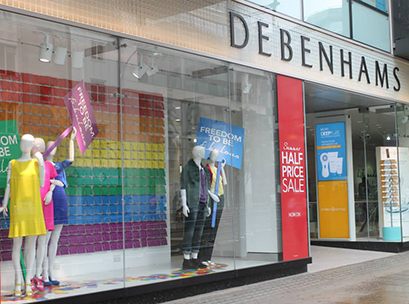Sales for June should provide a little cheer for retailers as winter bites but the outlook remains unsettling. Business and consumer confidence remains weak, despite the sugar hits of tax cuts and lower interest rates, neither of which is likely to provide the magic solution retailers are desperate to find. After flat retail sales in April and May, June and July should both be better courtesy of those winter chills and the mid-year sales that could capture a slice of the tax cuts. The wintry wea
weather certainly seemed to lift sales for department stores in May, but apparently it was not as kind to specialty fashion retailers, if the Australian Bureau of Statistics numbers are accurate.
However, the two-month bounce will probably not be sustained with higher taxes and charges triggered by the new financial year clawing back most, if not all, of the tax cut, and the interest rate cut providing little economic impetus.
According to the ABS, the annual growth rate for retail sales slowed to 2.4 per cent in May, well below the long-run average of 4 per cent over the year.
Retail sales continue to be buffeted by low wages growth, unemployment and under-employment, high household debt levels, the falling spending capacity of retirees and senior citizens, and structural change in the industry.
The forthcoming trading announcements for the full FY19 will be as interesting for the updates on the strategic initiatives of retailers as the actual sales and earnings results.
Retailers are continuing to rethink and structurally change their businesses in response to a new retail landscape beyond the cut and thrust of monthly and seasonal sales periods. The changes that are occurring are substantial and not just fiddling around the edges.
Retailers have streamlined supply chains but are still looking to further efficiencies and savings on buying, handling and merchandising their products. They have been forced to rethink marketing and communication with customers and to review store networks and productivity measures within stores.
Divesting entire brands
But some are facing more fundamental questions about the future of their businesses, including divestment of entire brands. Wesfarmers last year divested the Coles food, liquor and convenience chains via a listing on the Australian Securities Exchange, while Woolworths closed down its Masters Home Improvement chain and sold the Home Timber and Hardware business and, before that, Dick Smith.
Both Wesfarmers and Woolworths are attempting to breathe life into their discount department store chains and retreat from their fuel operations. Now, in a major play, Woolworths is opting to combine its Endeavour Drinks liquor and ALH hotels and gaming businesses into a single entity before divesting them in the next financial year. The decision will pare back Woolworths’ business to supermarkets in a remarkable shift of focus over the past five years.
Pepkor South East Asia has had a lot of soul-searching to do in the past three years following the financial problems of Steinhoff International. The company’s Greenlit Brands, which has a portfolio that includes Harris Scarfe and Best & Less, is now abandoning plans to roll out a network of 19 Debenhams department stores in Australia under a licence agreement with the renowned British retailer.
Only one Debenhams store was opened under the licence agreement that also extended to a range of Debenham merchandise in Harris Scarfe stores.
While the British retailer has been in financial difficulties, it is understood that the Debenhams store in St Collins Lane in Melbourne’s central business district and the merchandise sold in selected Harris Scarfe stores fell well short of expectations.
Greenlit Brands now has some deep thinking to do about the Harris Scarfe chain which has struggled for profitability.
After deciding to no longer issue quarterly sales figures and talking to its critic-in-chief, shareholder Solomom Lew, Myer also needs to make a call on its licence with another British retailer, John Lewis. It is understood the John Lewis merchandise has hardly set the world on fire and may be under review as Myer continues to search for a platform for sustainable growth.
Franchisors changing hands
Archer Capital has finally found a buyer for its Craveable Brands fast food portfolio that includes Red Rooster, Oporto and Chicken Treat just as an effective change of control seems to be looming for another franchisor in that sector, Retail Food Group.
PAG Asia Capital reportedly paid $500 million for Craveable Brands’ 580-plus stores across Australia, New Zealand, Sri Lanka and Singapore.
Meanwhile, Retail Food Group is negotiating with a Hong Kong company, Soliton Capital Partners, for a $160 million cash injection that would pay down debt to banks.
RFG has provided little detail on the transaction but told the ASX it related to the sale of a “non-core asset” which could be its international master franchises.
However, the effective control or ownership of Retail Food Group remains under speculation due to its debt, legal actions against the company and trading performance.

